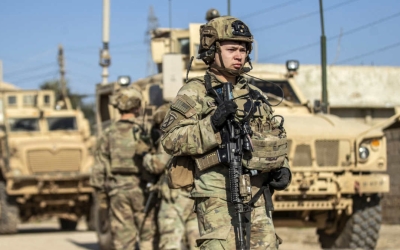US asked Iran to rein in Houthi attacks in secret Oman talks: Report

The US asked Iran to rein in Houthi attacks on commercial shipping during secret indirect talks held in Oman earlier this year.
The talks, which also included the US raising concerns about Iran’s nuclear programme, marked the first time the US and Iran have held negotiations in 10 months, according to a report by the Financial Times.
In keeping with past negotiations, the US and Iran didn’t engage directly but relied on Omani officials to carry messages. The meeting underlines how both Tehran and Washington are tapping backchannels to prevent their shadow war sparked by Israel’s war on Gaza from spilling over into a more intense regional conflict.
The White House’s top Middle East advisor Brett McGurk and Iran envoy Abram Paley led the talks on the US side, while Iranian Deputy Foreign Minister Ali Bagheri Kani represented the Islamic Republic, according to the FT.
McGurk has conducted several trips to the region since 7 October when the war between Israel and Palestine broke out after the Hamas-led attack on southern Israel. In January, Axios reported that he was set to visit Qatar and Egypt as part of efforts to reach a hostage deal between Hamas and Israel.
Stay informed with MEE's newsletters
Sign up to get the latest alerts, insights and analysis, starting with Turkey Unpacked
The Houthis began attacking commercial vessels in the Red Sea in November, in a move they said was done in solidarity with the Palestinians in Gaza.
The US and UK have responded with direct strikes on the Houthis, but have so far been unable to deter the group backed by Tehran. On Monday, the group claimed responsibility for an attack on a Liberian-flagged merchant ship.
The US accuses Iran and Lebanese Hezbollah of arming, training and providing intelligence to the Houthis, but western officials say the Houthis also operate with some degree of autonomy.
Iranian Revolutionary Guard officials are embedded inside Yemen with the Houthis, according to the US, but it’s unclear how much direct control they exert.
Proxy games
The Houthis are just one node in Iran’s so-called "axis of resistance", which also includes Lebanese Hezbollah and armed groups in Iraq and Syria. Dealing with the number of hot spots in the region has become a game of whack-a-mole for the Biden administration.
Since 7 October, Iranian proxies have launched more than 170 attacks on US forces, mainly in Iraq and Syria, according to the Institute For the Study of War. The deadliest strike that killed three US soldiers, however, caught US troops off guard at a little-known base in Jordan that supports the US’s mission in Syria.
That attack brought Iran and the US closer to the outbreak of a more intense regional war.
The Biden administration responded to the Jordan attack with dozens of strikes against Iranian assets, including one that killed a senior Iranian-backed militia commander in Baghdad with a hellfire missile fitted with switchblades, called the flying Ginsu.
Since then, attacks by Iran and its proxies on the US in Iraq and Syria have all but stopped.
Robert Ford, a former US ambassador to Syria, previously told MEE that the slowdown in strikes didn’t signal Iran is giving up on its main goal of expelling the US from the region, rather, it is the opposite.
“The Iranians are stomping hard for America to leave,” he told MEE. “They understand that events are slowly but surely going in their direction. They aren’t in a rush.”
The war in Gaza shattered the Biden administration’s boast that the Middle East region was “quieter today than it has been in two decades”.
The administration’s main focus before the war was sealing a normalisation agreement between Saudi Arabia and Israel while keeping a lid on tensions with Iran by quietly relaxing sanctions enforcement.
Weeks before 7 October, the US agreed to unfreeze $6bn in Iranian oil revenue held in South Korea, with Qatar serving as an intermediary. The Biden administration has since reversed that decision.
Middle East Eye delivers independent and unrivalled coverage and analysis of the Middle East, North Africa and beyond. To learn more about republishing this content and the associated fees, please fill out this form. More about MEE can be found here.





